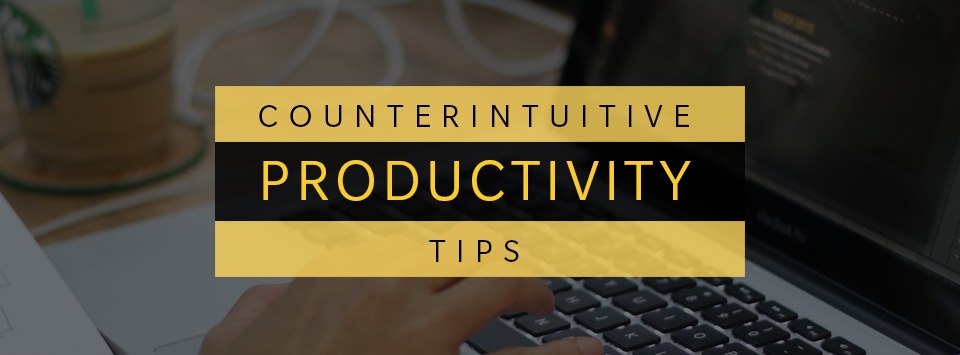Seven Counter-Intuitive Productivity Tips

It’s another 15 days before we close the year to welcome 2016! And this will be the final posting for 2015 about what’s important, urgent and really important but maybe not urgent – does this makes sense to you? We run from activity to activity, clients to customers, deadline after deadlines to simply clearing our emails.
So here’s 7 really cool and practical productivity tips I recently read from Rohei. I can 100% identify most is about “DON’T START YOUR BUSY WORK BY CHECKING YOUR EMAIL RIGHT AWAY” because it’s got a terrible way of stealing your time. Have a blessed Christmas and A Blessed 2016!! You go to work, check your email while munching on a blueberry muffin. You spend the whole morning responding to requests and questions, and finally achieve Inbox Zero. Phew. By lunchtime you feel like you just ran a marathon. You worked at lightning speed, but were you productive?
What if you forgot about a deadline because you were more preoccupied with answering not-so-urgent emails? Sometimes there are things we do instinctively because that’s what people do at work—check emails, go to meetings, write memos, update excel spreadsheets. But being busy is not the same as being productive. There are some things we can do that may make us appear or feel less busy, but actually translate to higher productivity.
Here are a few:
1. Don’t check your e-mail
Don’t check your e-mail right away. Checking your email puts you in response mode, addressing an assortment of demands and requests. Start the day instead by taking control of your time. Revisit your checklist and remind yourself of what the priorities for the day are. And get rid of the so-called frog— the task you perceive as most difficult, or the one you are likely to procrastinate on the most. Getting started on that dreaded task will give you a great feeling of accomplishment and will already be a big jumpstart to a productive day.
2. Choose paper over digital
We are all terribly reliant on technology for communication, organization and taking notes. But our Hospitality Consultant Ann Romey says, “I like to keep my phone strictly for messages and email.” She takes the classic paper route for planning, managing her calendar and making lists.” It allows me to focus,” she says, “when I try to do it on my phone, I get distracted by all the messages coming in.” Karen, our VP of Operations, agrees. “Papers and notebooks are the best for planning and processing ideas. When I go straight to software, I feel that I don’t process or retain the information as well.” Our Principal Consultant Helen takes all her notes from conversations, small meetings, and big meetings, in a binder-type notebook, with all the sections and notes labeled by topic and date, which makes it easy for her to access information about a particular conversation.
3. Stop before it’s perfect
“There’s no such thing as perfection,” Karen says. “Overanalyzing and overthinking can be very unproductive.” While we all work toward excellence and put our best into every task, there is a limit. There is always something that can be changed or improved, but the goal is not perfection. The goal is to meet needs and provide solutions to clients, and to each other. We should know when to stop and call a task done.
4. Block out your time
In most workplaces, people are at their supervisor’s disposal. But at ROHEI, having a culture of trust gives us freedom to protect our time when we need to. For example, our Marketing Team blocks out time weekly for data analytics and reporting to ensure it is faithfully accomplished each week. Operations teams block out time to handle special tasks like creating SOPs, creating systems to facilitate flow of information, or re-grouping to clarify roles.
We also block out times to collaborate and delegate. Most people feel that they are faster working on their own, without a team to care for. But the whole is greater than the sum of its parts. Initially a newly-formed team may take time to become a strong unit, but after a while the investment of time is reaped in increasing productivity.
Perhaps the most important time-blocking we do at ROHEI is on Mondays. Monday morning is staff discipleship time, in which our Chief Executive and leaders speak and share inspirational messages, give updates. The rest of Monday is spent on team communication, goal setting and planning. It’s almost a whole day of planning and discussions, but it ensures that the week is spent on the right things.
5. Limit meetings
Meetings help facilitate work and get consensus on important decisions. But meetings also create more work. So like everything else in life, meetings should have limits. Our batteries tend to drain, and attention span dissolves after 30 minutes to an hour of discussions. Meetings are also best done after lunch, to keep mornings free for people to do their most important work, as mornings are the brain’s peak time. Meetings also should preferably have food and coffee to keep everyone engaged and awake!
6. Take more breaks
There’s a story of an old man and a young man, both tasked with cutting as many trees as they can in the forest. Confident about his stamina, the young man cut trees all day, taking only one break. He cut down 25 trees. Meanwhile, the old man cut down 40 trees. “How did you do that?” The young man asked him. “I took 10-minute breaks every hour to sharpen my axe,” the old man explained. Though the young man had the stamina, the old man had the wisdom to take breaks—to rest physically and make sure his tools were in top form.
The same principle applies at the workplace. Breaks can be taken strategically—to recharge physically and mentally and also take a step back from our work and assess how we’re doing. Though it seems like you’re taking time away from work, it is actually more beneficial—it increases quality of work and productivity.
7. Sleep more
Have you ever experienced working all the way from 9am until about 10pm and you realize you’re working much slower, and then you stop and call it a day? The next day, you continue, doing the same thing and finish it 4 times faster.
The power of sleep is often underestimated in the corporate world. People trade sleep for a little more time to work. But that equation is out of balance. The more accurate equation is: proper sleep multiplies the quality and quantity of work.
We all have productivity hacks we discover along the way as we work, and let’s face it, doing some of them sometimes make us feel guilty, because they’re not the norm. Sometimes we feel like we have to work like machines because it looks like everyone else is. But in the right work culture, where we trust one another and know that each one has the company’s best interest in mind, we can choose the path of productivity that works best for us. When we see the bigger picture, beyond our desks, beyond the urgent and immediate, we take a broader view of our organization’s role and vision, and we work towards that vision. We view ourselves as a team and if we aim for productivity for the sake of the team, we are being good stewards of our time and are serving others well. And this makes our quest for productivity all the more purposeful and meaningful.
Questions to ponder on:
1. Have you discovered any counter-intuitive practices that help you be more productive at work? Perhaps waking your mind up with a video game before starting work?
2. Are you able to practice your own productivity techniques? Why or why not? How might you be able to introduce productivity practices in your workplace?


